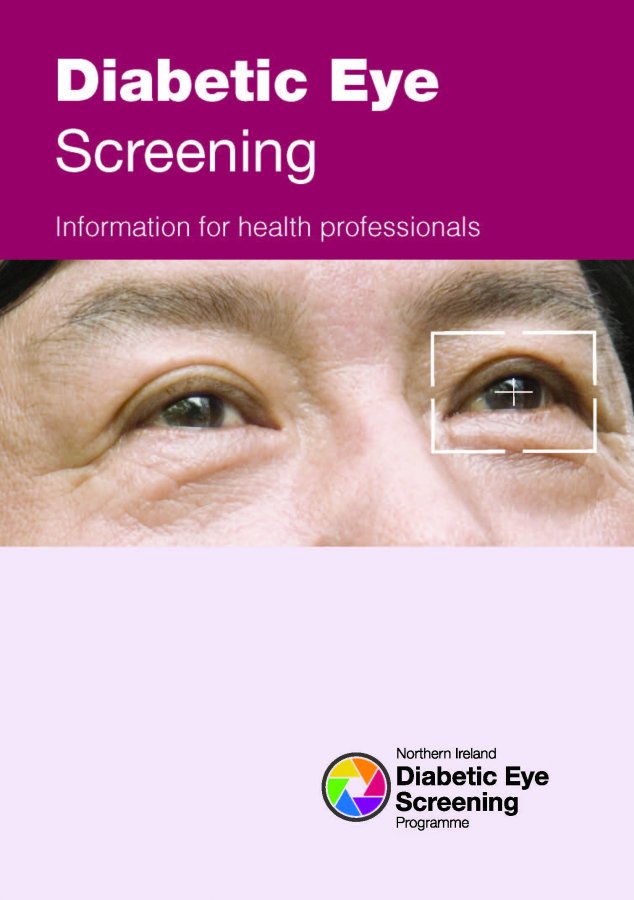Diabetic eye screening
Diabetic Eye Screening Programme (also known as Diabetic Retinopathy Screening)
In line with other regions of the UK, people who are at greatest risk of sight loss are being prioritised as the service is restored.
Extended screening intervals for those at lowest risk of sight loss
If you had no diabetic retinopathy detected at your most recent screening tests, you are in the lowest risk group and can expect to wait longer than normal for your next screening appointment.
Evidence in recent years, endorsed by the UK National Screening Committee, has shown that is it safe for you to wait up to 24 months between screening appointments. The chance of you developing sight-threatening retinopathy between these appointments is very small.
Extending the screening interval for those people who are at lowest risk, will allow the limited appointments we have available at this time to be targeted to those who are at higher risk.
What to do while you wait for your screening invite
While you wait for your next screening invite, it is important to be symptom aware. If you have any problems with your vision before your next screening appointment please contact your optician or GP.
Keeping blood glucose levels, blood pressure and cholesterol within the target range is important for your eye health. More information can be accessed on the Diabetes UK website www.diabetes.org.uk or contact your diabetes clinic.
Safety at eye screening appointment
All steps are being taken by the diabetic eye screening service to keep you safe when you attend for screening. You will be asked to wear a face covering, attend alone if possible and you may have to wait outside until the time of your appointment. While the environment may be different, the process for taking the photograph of your eye will be the same as before.
Diabetes is a common condition that affects approximately 4.7% of the population.
Around 87,000 people (and increasing) in Northern Ireland have been diagnosed with the condition. That's approximately 1 in every 22 people.
Diabetic eye screening is currently offered every year to patients aged 12 years and over. The only exception is people who have no light perception in either eye.
The aim of screening is to reduce the possible complications of diabetic retinopathy, which can cause sight loss and blindness. It is among the most common causes of blindness in people of working age.
If retinopathy is identified early - for example through screening - and treated appropriately, sight loss can be prevented in the majority of people with diabetes.
The Diabetic Eye Screening Programme (DESP) Regional Centre is based in Forster Green Hospital, but screening is carried out across Northern Ireland at GP practices and static sites.
Primary care practices have registers of patients with diabetes and this information is used to identify the people who need to be invited for screening. People eligible for screening will be invited at least once a year.
The appointment booking office is at Belfast Trust and can be contacted on 028 96 157600
Diabetic eye resources | HSC Public Health Agency
Information for people with diabetes, their families and carers
DESP leaflets
Users' views on the programme
When I went to the Diabetic Eye Screening Programme after being diagnosed with type 2 diabetes, I was advised to slowly bring down my blood sugars. I needed laser treatment in one eye. The early treatment helped me retain my sight. I cannot thank all the staff enough.
Arthur, March, 2016
The new diabetic eye screening worked like a dream – from the initial letter asking me to phone and make a suitable appointment time (which was then confirmed in writing) to the actual visit to my GP surgery, it went without a hitch.
The practice nurse applied the eye drops then we waited 10 minutes. Then the actual screening, which was less than five minutes, after which my wife drove me home. No problem!
Colin, March, 2016
Useful links
NHS Choices: www.nhs.uk/Conditions/Diabetic-retinopathy/Pages/Treatment.aspx
Diabetes UK: www.diabetes.org.uk/northernireland
RNIB: www.rnib.org.uk
Information for health professionals
The DESP aims to reduce the risk of sight loss through the early detection and treatment of diabetic retinopathy and maculopathy.
The DESP is coordinated and led by the PHA in collaboration with Belfast Health and Social Care Trust. Screening is delivered locally in line with national quality standards and protocols.
Health professionals leaflet
Useful links
NHS Choices: www.nhs.uk/Conditions/Diabetic-retinopathy/Pages/Treatment.aspx
Diabetes UK: www.diabetes.org.uk/northernireland
RNIB: www.rnib.org.uk




